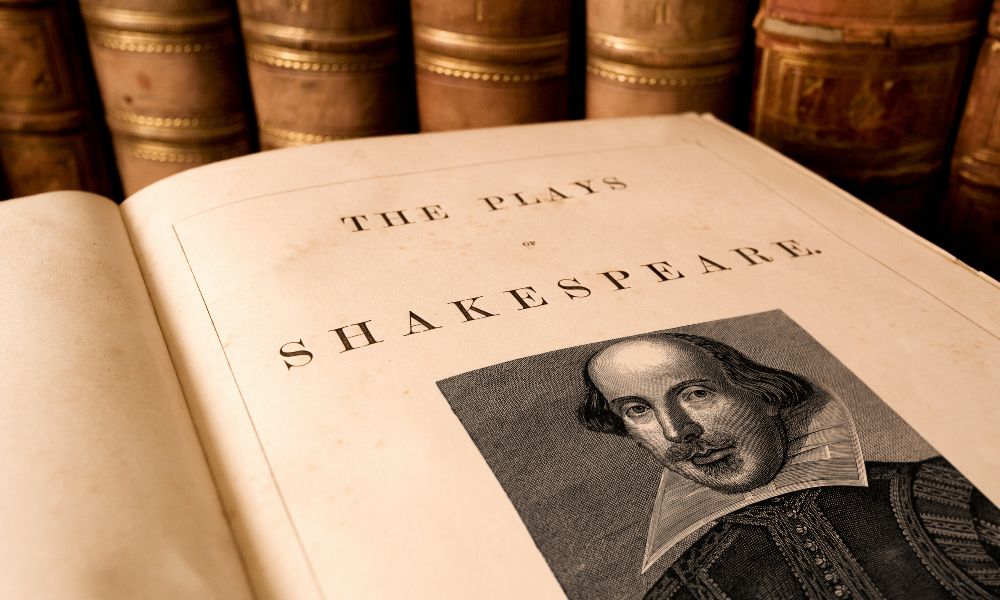Summary and Analysis of Shakespeare’s ‘Romeo and Juliet’
Shakespeare’s Romeo and Juliet is a renowned tragedy that has captivated audiences for centuries. Set in Verona, Italy, the play tells the tragic tale of two young lovers from feuding families who defy societal norms and face dire consequences. Exploring themes of love, fate, and the destructive power of hate, Romeo and Juliet showcases Shakespeare’s masterful storytelling and lyrical language.
In this analysis, we delve into the intricacies of the play, examining its characters, themes, and dramatic elements. We unravel the complexities of the central characters, Romeo and Juliet, their impulsive passion, and the challenges they face in a world consumed by hatred. Furthermore, we analyse the poetic language and rhetorical devices employed by Shakespeare, including metaphors, imagery, and soliloquies.
Through this analysis, we aim to deepen your appreciation and understanding of Romeo and Juliet, shedding light on its timeless relevance and universal themes. Whether you’re a student studying the play or a Shakespeare enthusiast seeking fresh insights, join us on this journey as we unravel the layers of tragedy, love, and fate in Romeo and Juliet.
Summary of Shakespeare’s ‘Romeo and Juliet’
Act 1:
The play opens in Verona, Italy, where two noble families, the Montagues and the Capulets, are engaged in a long-standing feud. Romeo, a young Montague, is love-sick over Rosaline, but his friends persuade him to attend a masked ball at the Capulet’s house. There, he meets Juliet, the daughter of Capulet, and they instantly fall in love. Unbeknownst to them, their families are bitter enemies.
Act 2:
Romeo and Juliet meet in secret and declare their love for each other. They decide to marry and seek the help of Friar Laurence, who agrees to marry them in hopes of ending the feud. Meanwhile, Tybalt, Juliet’s cousin, challenges Romeo to a duel, but Romeo refuses to fight. The scene ends with the famous balcony scene where Romeo professes his love for Juliet.

Act 3:
The conflict escalates when Tybalt kills Mercutio, one of Romeo’s friends. In a fit of rage, Romeo kills Tybalt and is banished from Verona by the Prince. Juliet is devastated by Romeo’s banishment but agrees to marry Count Paris, a suitor chosen by her parents. In desperation, she seeks help from Friar Laurence, who gives her a potion to make her appear dead.
Act 4:
Juliet takes the potion, and her family discovers her seemingly lifeless body the next morning. Believing she is dead, they prepare for her funeral. Meanwhile, Friar Laurence sends a message to Romeo informing him of the plan, but it fails to reach him. Romeo hears of Juliet’s death and rushes back to Verona.
Act 5:
Romeo arrives at the Capulet tomb and encounters Paris, whom he kills in a duel. Heartbroken, Romeo takes poison and dies next to Juliet’s body. Moments later, Juliet awakens and finds Romeo dead. Devastated, she stabs herself with Romeo’s dagger. The tragedy of their deaths brings the Montagues and Capulets together in grief and ends their long-standing feud.
In conclusion, Romeo and Juliet is a tragic love story that explores themes of love, loyalty, and the destructive power of feuds. The play highlights the intensity and impulsive nature of young love, as well as the consequences of hatred and violence. Despite their tragic fate, Romeo and Juliet’s love remains a symbol of passion and devotion.
Character analysis
Romeo Montague
Romeo is one of the central characters in Shakespeare’s play, Romeo and Juliet. He is a young and passionate Montague who is deeply influenced by his emotions. He is a young Montague who is initially infatuated with Rosaline but quickly falls deeply in love with Juliet when they meet at the Capulet’s ball. He is passionate, impulsive, and prone to melodramatic expressions of emotion. Romeo is characterised by his romanticism, his tendency to act on his emotions, and his willingness to risk everything for love. Here are some key aspects of Romeo’s character:
- Romanticism
- Impulsiveness
- Emotional Intensity
- Growth and Maturity
- Tragic Hero
Juliet Capulet
Juliet is a young Capulet who is intelligent, independent, and mature beyond her years. She is a young and innocent Capulet who is caught in the midst of a bitter feud between her family and the Montagues. She is initially obedient to her parents but rebels against their wishes when she falls in love with Romeo. Juliet’s character develops throughout the play as she displays courage, loyalty, and determination. She is willing to defy societal expectations and risk her life for her love for Romeo. Here are some key aspects of Juliet’s character:
- Youthful Innocence
- Passionate and Determined
- Intelligence and Wit
- Strength and Resilience
- Tragic Heroine
Friar Laurence
Friar Laurence is a wise and compassionate Franciscan friar who serves as a mentor to Romeo. He is knowledgeable in herbs and potions and agrees to marry Romeo and Juliet in secret, hoping to reconcile the feuding families. However, his plans ultimately lead to tragedy as his message informing Romeo of Juliet’s fake death does not reach him in time. Friar Laurence represents the struggle between good intentions and unintended consequences. Here are some key aspects of Friar Laurence’s character:
- Wise and Knowledgeable
- Compassionate and Caring
- Mediator and Peacemaker
- Flawed Judgment
- Symbol of Religion and Spirituality
Mercutio
Mercutio is Romeo’s close friend and a kinsman to the Prince. He is known for his wit, wordplay, and playful nature. Mercutio serves as a foil to Romeo, representing a more cynical and practical outlook on love. His death at the hands of Tybalt sparks a turning point in the play, leading to Romeo’s revenge and subsequent banishment. Here are some key aspects of Mercutio’s character:
- Wit and Wordplay
- Free-Spirited and Nonconformist
- Loyalty and Friendship
- Symbol of Love and Passion
- Tragic Fate
Tybalt
Tybalt is Juliet’s hot-headed cousin and a skilled swordsman. He is fiercely loyal to his family and despises the Montagues. Tybalt’s aggressive nature and desire for revenge contribute to the escalating tensions and ultimately lead to his own death at the hands of Romeo. He symbolises the destructive power of hatred and the consequences of unchecked violence. Here are some key aspects of Tybalt’s character:
- Hot-Tempered and Proud
- Skilled Swordsman
- Loyalty to Family
- Catalyst for Conflict
- Symbol of Hatred and Impulsivity
NurseThe Nurse is Juliet’s trusted confidante and surrogate mother figure. She has raised Juliet since infancy and is deeply devoted to her. The Nurse provides comic relief with her bawdy humour and often acts as a mediator between Romeo and Juliet. However, her advice and loyalties are tested when she becomes torn between her loyalty to Juliet and her loyalty to her family. Here are some key aspects of Nurse’s character:
- Motherly Figure
- Comic Relief
- Loyalty and Devotion
- Limited Understanding
- Emotional Impact
Context of ‘Romeo and Juliet’
The context of Romeo and Juliet refers to the historical and social background in which the play is set and written. Understanding the context helps to provide a deeper appreciation of the themes, conflicts, and characters in the play. Set in 16th-century Verona, Italy, the play takes place during a time of societal and political unrest. The city is characterised by feuding noble families, namely the Montagues and the Capulets, whose long-standing enmity fuels the tragic events that unfold. The feud reflects the deeply entrenched divisions within Veronese society and highlights the destructive consequences of hatred and violence.
Renaissance Italy

Religion
Religion plays a significant role in the context of Romeo and Juliet, as the characters and events are deeply influenced by the religious beliefs and practices of the time. In 16th-century Verona, the predominant religion was Catholicism, which shaped the lives and world views of the characters.
The religious context is evident in various aspects of the play.
- The language and imagery used by the characters often contain religious references. They make frequent allusions to heaven, hell, sin, and divine intervention. This reflects the religious mindset of the era and the belief in a higher power that governs human destiny.
- The sacrament of marriage holds great importance in the play. Romeo and Juliet’s secret marriage is a central plot point, and the religious rituals associated with marriage are observed. The involvement of Friar Laurence, a Catholic priest, underscores the religious significance of the union.
- The conflict between the Montagues and the Capulets can be seen as emblematic of the religious divisions of the time. While not explicitly stated in the play, the Montagues are often associated with being Catholic, while the Capulets are associated with being of a different religious affiliation. This religious divide adds another layer to the animosity between the two families and intensifies the conflict.
Fate and Astrology
The belief in fate and the influence of astrology were prevalent during Shakespeare’s time. This belief is woven throughout the play, with references to stars, fortune, and predestined events. The idea of fate underscores the tragic nature of the story and raises questions about the extent of human agency and the role of external forces in shaping destiny.
Feudal Society
The play reflects the social structure of feudal society, where the noble families, such as the Montagues and Capulets, hold power and influence. The feuding between these families is a central conflict in the play and represents the destructive nature of such divisions.
Love and Courtly
TraditionThe play explores the themes of love, courtship, and the traditions of courtly love. These themes were prevalent during the Renaissance period, with a focus on idealised and often forbidden love. Romeo and Juliet’s love challenges societal norms and expectations, highlighting the tension between individual desire and societal constraints.
Theatrical Context
Romeo and Juliet was written and performed during the Elizabethan era, a time of prolific theatrical activity in England. The play was written to be performed on an open-air stage, with minimal set designs and props. Understanding the theatrical conventions of the time helps in interpreting the play’s language, structure, and dramatic impact.

‘Romeo and Juliet’ Themes
Romeo and Juliet, one of William Shakespeare’s most famous plays, explores various themes that are still relevant today. These themes intertwine throughout the play, showcasing the complexities of human emotions and the consequences of societal and familial conflicts. Romeo and Juliet serves as a timeless exploration of love, fate, and the human condition. Here are some of the key themes in Romeo and Juliet.
Love
The theme of love is central to Romeo and Juliet, as the entire plot revolves around the passionate love between the two main characters. Love in Romeo and Juliet is portrayed as a force that is both exhilarating and destructive. From the moment Romeo lays eyes on Juliet, he describes her beauty with poetic admiration, exclaiming, “Did my heart love till now? Forswear it, sight! For I ne’er saw true beauty till this night” (Act 1, Scene 5). This quote encapsulates the idea of love at first sight, where Romeo’s world is instantly transformed by Juliet’s presence. Their love is further exemplified in the famous balcony scene, where Juliet professes her love for Romeo, saying, “My bounty is as boundless as the sea, My love as deep; the more I give to thee, The more I have, for both are infinite” (Act 2, Scene 2).These words express the boundless and limitless nature of their love. However, love in the play is not without its complications. Friar Laurence warns Romeo about the hastiness of his love, stating, “These violent delights have violent ends” (Act 2, Scene 6). This foreshadows the tragic consequences that love can bring. Ultimately, the theme of love in Romeo and Juliet explores the profound passion and the inherent risks and consequences associated with it.
Fate and Destiny
The idea of fate is prominent in Romeo and Juliet. The characters often believe that their lives are predestined, and they are powerless to change their tragic outcomes. The play raises questions about free will and the role of destiny in human lives. The theme of fate and destiny in Romeo and Juliet is woven throughout the play, highlighting the characters’ belief in the predetermined nature of their lives. This notion is exemplified in the opening lines of the play, when the chorus declares, “A pair of star-cross’d lovers take their life”(Prologue). The use of the term “star-cross’d” suggests that the fate of Romeo and Juliet is written in the stars, and their tragic end is inevitable. Romeo himself acknowledges the power of fate when he exclaims, “I am fortune’s fool!” (Act 3, Scene 1), after inadvertently causing the death of Tybalt. This line conveys Romeo’s belief that he is a victim of fate’s cruel whims. Juliet, too, laments the constraints of destiny when she says, “O Fortune, Fortune! All men call thee fickle” (Act 3, Scene 5), suggesting that fate is unpredictable and capricious. The theme of fate and destiny in Romeo and Juliet underscores the characters’ struggles against the forces that seem to control their lives, ultimately leading to their tragic end.
Conflict
The feud between the Montagues and the Capulets serves as a backdrop for the play’s events. The theme of conflict explores the destructive nature of hatred, the consequences of violence, and the struggle for peace and reconciliation. The theme of conflict in Romeo and Juliet permeates the play, driving the plot forward and fuelling the tensions between families, friends, and individuals. The most prominent conflict in the play is the longstanding feud between the Montagues and Capulets. This conflict is vividly described by Benvolio in Act 1, Scene 1, when he says, “I do but keep the peace. Put up thy sword, Or manage it to part these men with me”(Act 1, Scene 1). The quote showcases the ongoing violence between the two families and the desperate attempt of Benvolio to maintain peace. Additionally, the internal conflict within Romeo himself is evident throughout the play. In Act 3, Scene 3, Romeo exclaims, “O sweet Juliet, thy beauty hath made me effeminate, / And in my temper softened valor’s steel!” (Act 3, Scene 3). This quote reflects Romeo’s inner conflict between his love for Juliet and his loyalty to his family, as he grapples with the consequences of his actions. The theme of conflict in Romeo and Juliet highlights the destructive nature of unresolved disputes, both external and internal, and serves as a catalyst for the tragic events that unfold in the play.
Youth and Impulsiveness
Romeo and Juliet are young and impulsive, driven by their intense emotions and desire for immediate gratification. The theme of youth highlights the passion, recklessness, and vulnerability of young love. The theme of youth and impulsiveness is a central aspect of Romeo and Juliet, capturing the impetuous nature of young love and the consequences of hasty actions. The characters’ youthful energy and impulsive decisions drive the plot and contribute to the tragic outcome of the play. In Act 2, Scene 2, Juliet expresses her impatience for the night to come so she can be with Romeo, saying, “Come, night, come, Romeo, come, thou day in night; / For thou wilt lie upon the wings of night / Whiter than new snow on a raven’s back” (Act 2, Scene 2). This quote showcases Juliet’s eagerness to be with Romeo, disregarding the risks and consequences. Similarly, Romeo’s impulsive nature is evident when he impulsively decides to attend the Capulet’s party, leading to his encounter with Juliet. In Act 1, Scene 4, Romeo states, “I fear, too early, for my mind misgives / Some consequence yet hanging in the stars / Shall bitterly begin his fearful date / With this night’s revels” (Act 1, Scene 4). This quote reveals Romeo’s foreboding sense of destiny, but he chooses to attend the party regardless. The theme of youth and impulsiveness in Romeo and Juliet emphasises the intensity and passion of young love, while also highlighting the dangers of acting without thoughtful consideration.
Appearance vs Reality
The play explores the contrast between how things appear and their true nature. Characters often wear masks, both literally and figuratively, and their actions and words can be deceiving. The theme of appearance vs. reality is explored throughout Romeo and Juliet, highlighting the contrast between what appears to be true and the underlying reality. The characters often wear masks or engage in deception, leading to misunderstandings and tragic consequences. In Act 1, Scene 5, when Romeo first sees Juliet at the Capulet’s party, he remarks, “Did my heart love till now? Forswear it, sight! / For I ne’er saw true beauty till this night” (Act 1, Scene 5). This quote reflects Romeo’s initial perception of Juliet’s beauty, seeing her as a manifestation of pure love. However, their love is complicated by the feuding families they belong to, which creates a stark contrast between the appearance of love and the reality of the obstacles they face. Additionally, the character of Friar Laurence plays a role in the theme of appearance vs. reality. In Act 2, Scene 6, he warns Romeo about the hastiness of their love, stating, “These violent delights have violent ends / And in their triumph die, like fire and powder” (Act 2, Scene 6). Friar Laurence’s warning alludes to the idea that what may seem like true love and bliss can quickly lead to tragic consequences. The theme of appearance vs. reality in Romeo and Juliet serves as a reminder that things are not always what they seem, and the consequences of mistaken appearances can be severe.
Loyalty vs Betrayal
Loyalty and betrayal are explored through the actions of characters like Friar Laurence and Mercutio. The theme delves into the complexities of trust, loyalty, and the consequences of betrayal. The theme of loyalty vs. betrayal is a prominent element in Romeo and Juliet, as characters grapple with conflicting loyalties and face the consequences of betrayal. One example of loyalty is demonstrated by Romeo’s close friend, Mercutio. In Act 3, Scene 1, Mercutio defends Romeo’s honour when he is insulted by Tybalt, saying, “O calm, dishonorable, vile submission! / Alla stoccata carries it away. / Tybalt, you rat-catcher, will you walk?”(Act 3, Scene 1). Mercutio’s loyalty to Romeo compels him to engage in a duel with Tybalt, ultimately leading to his own demise. On the other hand, there is a clear betrayal of loyalty in the character of Friar Laurence. In Act 5, Scene 2, when he realises the tragic consequences of the secret marriage between Romeo and Juliet, he confesses his role in their ill-fated union, stating, “I am the greatest, able to do least, / Yet most suspected, as the time and place / Doth make against me of this direful murder”(Act 5, Scene 2). Friar Laurence’s betrayal of his loyalty to Romeo and Juliet by orchestrating their secret marriage and failed plan ultimately contributes to their tragic deaths. The theme of loyalty vs. betrayal in Romeo and Juliet serves as a reminder of the complex nature of human relationships and the profound impact of loyalty and betrayal on individuals and their destinies.
Quotes from ‘Romeo and Juliet’
- “O Romeo, Romeo, wherefore art thou Romeo?” (Juliet, Act 2, Scene 2) – Theme: Love
- “For never was a story of more woe than this of Juliet and her Romeo.” (Prince Escalus, Act 5, Scene 3) – Theme: Tragedy
- “These violent delights have violent ends.” (Friar Laurence, Act 2, Scene 6) – Theme: Fate
- “What’s in a name? That which we call a rose by any other name would smell as sweet.” (Juliet, Act 2, Scene 2) – Theme: Identity
- “A plague o’ both your houses!” (Mercutio, Act 3, Scene 1) – Theme: Conflict
- “Wisely and slow; they stumble that run fast.” (Friar Laurence, Act 2, Scene 3) – Theme: Impulsiveness
- “My only love sprung from my only hate!” (Juliet, Act 1, Scene 5) – Theme: Love and Conflict
- “My bounty is as boundless as the sea, my love as deep; the more I give to thee, the more I have, for both are infinite.” (Juliet, Act 2, Scene 2) – Theme: Love
- “Good night, good night! Parting is such sweet sorrow.” (Juliet, Act 2, Scene 2) – Theme: Love and Separation
- “Doth with their death bury their parents’ strife.” (Chorus, Prologue) – Theme: Tragedy and Conflict
These quotes capture the essence of various themes explored in Romeo and Juliet, such as love, fate, tragedy, identity, conflict, impulsiveness, and more.
‘Romeo and Juliet’ Symbols
In Romeo and Juliet, several symbols are used to enhance the themes and add depth to the story. Here are some notable symbols in the play:
- Poison: Poison symbolises the destructive nature of love and the consequences of impulsive actions. It is used by Romeo and Juliet as a means to end their lives and serves as a tragic symbol of their doomed love.
- The Balcony: The balcony represents a place of intimacy and secrecy where Romeo and Juliet exchange their vows of love. It symbolises their hidden relationship and the forbidden nature of their love.

- Light and Dark: Light and dark imagery is used throughout the play to symbolise the stark contrast between love and hate, innocence and corruption, and truth and deception. It highlights the emotional turmoil and conflicts faced by the characters.
- The Dagger: The dagger is a symbol of violence and death. It is used by Juliet to take her own life and symbolises the tragic consequences of the feuding families’ hatred.
- The Stars: The stars are a recurring symbol in Romeo and Juliet, representing fate and destiny. Romeo and Juliet often make references to the stars as they believe their lives are predetermined, and their tragic ending is a result of their ill-fated destiny.

- Masks: Masks are used during the Capulet’s masquerade ball, symbolising the idea of disguise and deception. They reflect the façade maintained by the characters, as well as the societal expectations and constraints that prevent Romeo and Juliet from openly expressing their love.
These symbols add layers of meaning and evoke powerful emotions within the play, contributing to the overall tragedy and intensity of Romeo and Juliet’s story.
If you’re a fan of literature and appreciate the timeless works of William Shakespeare, dive into the captivating world of his plays!
Explore the intricacies of characters, themes, and language that have enchanted audiences for centuries. Join us on this journey of literary exploration and analysis.
Discover how Shakespeare’s plays are not just relics of the past but living, breathing works of art that have the power to provoke thought and spark conversations about the timeless issues of love, betrayal, ambition, and more.
Check our blog posts on other plays by Shakespeare below!
- A Midsummer Night’s Dream
- The Tempest
- Macbeth
- King Lear
- Hamlet
- Richard III
- Othello
- The Merchant of Venice
- Much Ado About Nothing
Book a free assessment at your nearest Success Tutoring centre today!
Ready to unlock your child’s full potential in English? Book a free assessment at your nearest Success Tutoring centre today!Our team of expert tutors is dedicated to helping students excel in reading, writing, and critical thinking. Whether your child needs support in grammar, vocabulary, or literature analysis, we have a tailored program to suit their unique learning style and goals.With our personalised approach and engaging curriculum, we create a nurturing environment where your child can build confidence, improve their language skills, and develop a lifelong love for learning!Don’t let academic challenges hold your child back. Empower them to succeed in English and beyond. Take the first step towards their educational success by scheduling a free assessment now.Give your child the gift of knowledge and watch them soar to new heights in their academic journey. Let’s make learning English a rewarding and enjoyable experience together!





